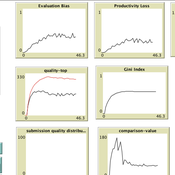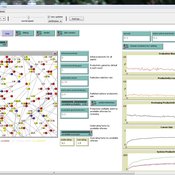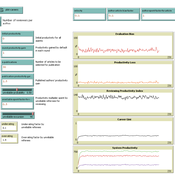
Flaminio Squazzoni
Affiliations Professional homepagehttp://behavelab.org/flaminio-squazzoni/
ORCID more infohttps://orcid.org/0000-0002-6503-6077
GitHub more infoNo associated GitHub account.
Flaminio Squazzoni is Full Professor of Sociology at the Department of Social and Political Sciences of the University of Milan and director of BEHAVE. He teaches “Sociology” to undergraduate students, “Behavioural Sociology” to master students and “Behavioural Game Theory” to PhD students. Untill November 2018, he has been Associate Professor of Economic Sociology at the Department of Economics and Management of the University of Brescia, where he led the GECS-Research Group on Experimental and Computational Sociology.
He is editor of JASSS-Journal of Artificial Societies and Social Simulation, co-editor of Sociologica -International Journal for Sociological Debate and member of the editorial boards of Research Integrity and Peer Review and Sistemi Intelligenti. He is advisory editor of the Wiley Series in Computational and Quantitative Social Science and the Springer Series in Computational Social Science and member of the advisory board of ING’s ThinkForward Initiative. He is former President of the European Social Simulation Association (Sept 2012/Sept 2016, since 2010 member of the Management Committee) and former Director of the NASP ESLS PhD Programme in Economic Sociology and Labour Studies (2015-2016).
Research Interests
His fields of research are behavioural sociology, economic sociology and sociology of science, with a particular interest on the effect of social norms and institutions on cooperation in decentralised, large-scale social systems. His research has a methodological focus, which lies in the intersection of experimental (lab) and computational (agent-based modelling) research.
Diffusion of Eco-Innovation through Inter-firm Network Targeting: An Agent-Based Model
apyka Flaminio Squazzoni Shyaam Ramkumar Matthias Mueller | Published Monday, January 10, 2022This model is developed as a theoretical agent-based model to study the general phenomena of network-based targeting strategies on eco-innovation adoption and diffusion through inter-firm networks.
Peer Review Game
Giangiacomo Bravo Flaminio Squazzoni Francisco Grimaldo Federico Bianchi | Published Monday, April 30, 2018NetLogo software for the Peer Review Game model. It represents a population of scientists endowed with a proportion of a fixed pool of resources. At each step scientists decide how to allocate their resources between submitting manuscripts and reviewing others’ submissions. Quality of submissions and reviews depend on the amount of allocated resources and biased perception of submissions’ quality. Scientists can behave according to different allocation strategies by simply reacting to the outcome of their previous submission process or comparing their outcome with published papers’ quality. Overall bias of selected submissions and quality of published papers are computed at each step.
Peer Review Model
Flaminio Squazzoni Claudio Gandelli | Published Wednesday, September 05, 2012 | Last modified Saturday, April 27, 2013This model looks at implications of author/referee interaction for quality and efficiency of peer review. It allows to investigate the importance of various reciprocity motives to ensure cooperation. Peer review is modelled as a process based on knowledge asymmetries and subject to evaluation bias. The model includes various simulation scenarios to test different interaction conditions and author and referee behaviour and various indexes that measure quality and efficiency of evaluation […]
Peer Review with Multiple Reviewers
Flaminio Squazzoni Federico Bianchi | Published Thursday, September 10, 2015This ABM looks at the effect of multiple reviewers and their behavior on the quality and efficiency of peer review. It models a community of scientists who alternatively act as “author” or “reviewer” at each turn.
Under development.


